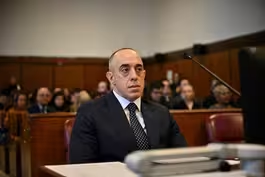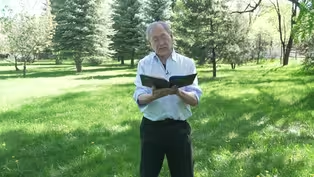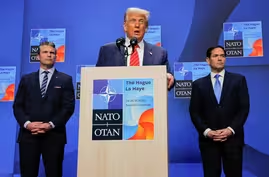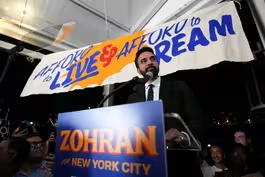
NATO secretary general on Trump, Ukraine and spending
Clip: 6/25/2025 | 5m 39sVideo has Closed Captions
NATO Secretary General Mark Rutte on Trump, Ukraine and new spending commitments
To talk about President Trump, Ukraine and NATO’s new spending commitments, Nick Schifrin sat down with Secretary General Mark Rutte.
Problems playing video? | Closed Captioning Feedback
Problems playing video? | Closed Captioning Feedback
Major corporate funding for the PBS News Hour is provided by BDO, BNSF, Consumer Cellular, American Cruise Lines, and Raymond James. Funding for the PBS NewsHour Weekend is provided by...

NATO secretary general on Trump, Ukraine and spending
Clip: 6/25/2025 | 5m 39sVideo has Closed Captions
To talk about President Trump, Ukraine and NATO’s new spending commitments, Nick Schifrin sat down with Secretary General Mark Rutte.
Problems playing video? | Closed Captioning Feedback
How to Watch PBS News Hour
PBS News Hour is available to stream on pbs.org and the free PBS App, available on iPhone, Apple TV, Android TV, Android smartphones, Amazon Fire TV, Amazon Fire Tablet, Roku, Samsung Smart TV, and Vizio.
Providing Support for PBS.org
Learn Moreabout PBS online sponsorshipNICK SCHIFRIN: This evening, I spoke with Secretary-General Mark Rutte to talk about President Trump, Ukraine and NATO's new historic spending commitment.
What will NATO collectively be able to do with that spending that it wasn't able to before?
MARK RUTTE, NATO Secretary-General: Defend ourselves against the Russians.
We can defend ourselves now, but there is a big risk in three, five, seven years from now without the extra spending that you would not be able to do that.
And I think it's also fair, because it means that Europe and Canada will basically move to the same level of spending as the U.S. is doing currently.
And I think that's fair, that the U.S. is not paying more than the others.
NICK SCHIFRIN: Let's talk about the United States.
With all due respect, some of your language to President Trump has been a little obsequious over the last few days.
You called him daddy today?
MARK RUTTE: No, no.
I can explain to you what I mean.
NICK SCHIFRIN: In passing, right?
And you wrote a note to him a few days ago that included the phrase "You will achieve something' at this summit.
This is a note that the president made public.
Do you fear that that language undermines your argument that these countries are not spending 5 percent in order to please a president, but, in fact, to actually face off against their adversaries?
MARK RUTTE: Well, half of the reason to spend more is to equalize with the United States.
This is a consistent argument by President Trump.
The other reason is that we needed extra spending, as I said, to be sure that we can defend ourselves if the Russians would try something against us.
NICK SCHIFRIN: But is the language demeaning?
MARK RUTTE: No, not at all.
I like the guy.
We are befriended, President Trump and myself, and this is the way I communicate, and I had absolutely no problem that he brought it out.
NICK SCHIFRIN: And, again, you're saying that "You will achieve something."
You don't think that takes away from your argument that these countries are making this decision not about Trump, but about their own future?
MARK RUTTE: It's about both.
It is about the future.
Make sure that you can defend yourself.
But it's also because the U.S. has consistently, and this president very effectively since 2016 -- we are spending now outside the U.S. a trillion extra in aggregate, and it will equalize with the U.S.
So both sides of the argument, equalize with the United States, being able to defend ourselves against the Russians, the Chinese built up North Korea, these two reasons, both very effective, very important.
NICK SCHIFRIN: Some senior NATO officials tell me that they want you to be more pressuring on Trump, that it's OK to use flattery, but they want you to pressure Trump specifically on keeping U.S. troops in Europe.
Are you pushing Trump to keep U.S. troops in Europe in private?
MARK RUTTE: I'm always fascinated by some of my European colleagues, because first they were afraid that he would leave us and that -- and this is why I used daddy.
I didn't say that he is daddy.
What I said is it is a bit like a small child looking up to his dad and saying, daddy, are you leaving the family?
It's not me calling Trump daddy.
But that's as I used it.
NICK SCHIFRIN: But do you think President Trump -- do you think President Trump considers NATO members children?
MARK RUTTE: No, but some of the NATO members here in Europe, sometimes, when they ask these questions, behave a bit childish.
The great thing about today is that we have 32 grown-up leaders at the table saying, we sign up to this, we have to do this.
NICK SCHIFRIN: To that point, yesterday, when President Trump was asked whether he would defend Article 5, he said -- quote -- "It depends on your definition."
He and his top aides, as you know, have said that Europe was ripping the U.S. off.
But this afternoon, he said this: DONALD TRUMP: And I left here differently.
I left here saying that these people really love their countries.
It's not a ripoff.
And we're here to help them protect their country.
NICK SCHIFRIN: Do you think he was withholding an endorsement of Article 5 until NATO members today proverbially signed on the dotted line?
MARK RUTTE: No, no, not for a second.
He is totally committed to NATO.
He is totally committed to Article 5.
But this irritant is there.
Hey, guys, you have got to spend more.
It's crazy that we in the U.S. spent so much.
You are in this with a defense spending level which is too low.
And we have to equalize.
NICK SCHIFRIN: Last year, NATO declared Ukraine's membership irreversible.
That language is not repeated in the communique today, although you did use it twice in the press conference.
But bottom line, is Ukraine membership off the table?
MARK RUTTE: No, and the language has not changed.
So this language on long-term threat, on Ukraine having this irreversible path into NATO and all these other paragraphs from previous meetings are still valid.
Today basically is putting an emphasis on three elements.
One is spending, second, industrial production,third, the practical support for Ukraine to keep them in the fight and to get them as strong as possible after a peace deal.
NICK SCHIFRIN: On that practical support, Russia continues to make small gains in Eastern Ukraine, even though it takes incredibly high losses.
MARK RUTTE: Yes.
NICK SCHIFRIN: The Biden era weapons that the Biden administration sent to Ukraine are beginning to run out.
The Trump administration has not committed to spending more money to send more weapons to Ukraine.
Does that make Ukraine vulnerable, especially as Europe is only trying to catch up in terms of production of weapons?
MARK RUTTE: No.
And what you see this year is that already Europeans and Canadians have pledged $35 billion in the first half-year, and the full pledge last year was over $50 billion.
And I find it totally acceptable that the U.S. is saying, hey, to the Europeans, you should pay more here.
(CROSSTALK) NICK SCHIFRIN: But I'm talking about Ukraine.
Is Ukraine vulnerable as American weapons reduce on the battlefield?
MARK RUTTE: No, no, no.
We make sure collectively with the U.S. that Ukraine stays as strong as possible.
NICK SCHIFRIN: And finally, quickly, Finland Estonia, Latvia, Lithuania, Poland are planning to leave a land mine treaty to mine their borders with Russia.
It's being called an iron curtain.
What does it say about Russia's long-term threat beyond Ukraine to NATO and Europe?
MARK RUTTE: I think it is evidence and testimony to the fact that Russia is a threat today, is a threat long term and very much felt so all over the alliance.
NICK SCHIFRIN: Mark Rutte, secretary-general of NATO, thank you very much.
MARK RUTTE: Thank you very much.
Jon Finer on aftermath and consequences of strikes on Iran
Video has Closed Captions
Clip: 6/25/2025 | 5m 19s | Jon Finer analyzes aftermath and potential consequences of U.S. strikes on Iran (5m 19s)
Judicial nominee faces scrutiny over Trump relationship
Video has Closed Captions
Clip: 6/25/2025 | 6m 26s | Trump judicial nominee faces scrutiny for willingness to defy court orders (6m 26s)
Poet Arthur Sze on bridging Western and Chinese traditions
Video has Closed Captions
Clip: 6/25/2025 | 5m 57s | Acclaimed poet Arthur Sze on bridging Western and Chinese traditions (5m 57s)
Rio Grande Valley voters explain why the area shifted to GOP
Video has Closed Captions
Clip: 6/25/2025 | 8m 36s | Rio Grande Valley voters explain why the area shifted support to GOP in last election (8m 36s)
Senate committee hears Trump request to claw back funding
Video has Closed Captions
Clip: 6/25/2025 | 3m 29s | Senate committee hears White House request to claw back foreign aid, public media funding (3m 29s)
Trump insists U.S. 'obliterated' Iranian nuclear sites
Video has Closed Captions
Clip: 6/25/2025 | 5m 9s | Trump insists U.S. strikes 'obliterated' nuclear sites, says talks with Iran could resume (5m 9s)
What Mamdani's win in NYC means for Democrats nationwide
Video has Closed Captions
Clip: 6/25/2025 | 6m | What Zohran Mamdani's primary win in New York means for Democrats nationwide (6m)
Providing Support for PBS.org
Learn Moreabout PBS online sponsorship
- News and Public Affairs

FRONTLINE is investigative journalism that questions, explains and changes our world.

- News and Public Affairs

Amanpour and Company features conversations with leaders and decision makers.












Support for PBS provided by:
Major corporate funding for the PBS News Hour is provided by BDO, BNSF, Consumer Cellular, American Cruise Lines, and Raymond James. Funding for the PBS NewsHour Weekend is provided by...






